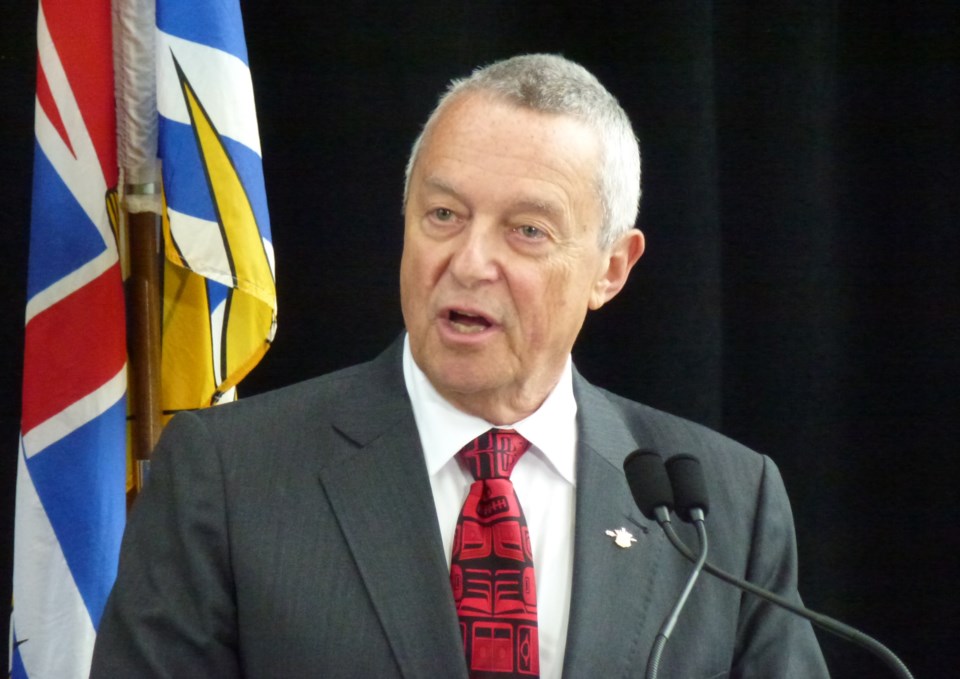The minister giveth and the minister taketh away.
In an interview Friday, Peter Fassbender, the minister responsible for TransLink, said Metro Vancouver mayors can impose a vehicle levy to fund regional transit expansion without holding a new referendum.
His statements in the first interview — repeatedly insisting a vehicle levy would not trigger a referendum because it’s already enabled in TransLink’s legislation — surprised Metro Vancouver mayors, some of whom said they wouldn’t have forced a referendum on a regional sales tax had they been told that in 2014. (See original story at the end of this article.)
But later, he said: “I misspoke when it came to the vehicle levy, and I do apologize for that," adding that in addition to the need for the province to enable ICBC to collect an annual vehicle registration fee, “it is also a new tax, therefore it would be subject to a plebiscite or a referendum with the public.”
That’s back in line with the BC Liberals’ consistent position on the transit referendum requirements since it was imposed by Premier Christy Clark as part of the party’s 2013 election platform.
Legislation subsequently passed by the provincial government spelled out not just new fees or taxes but any amendment to legislation to enable enforcement of sources — such as a vehicle levy collected by ICBC — as being within the definition of “additional funding sources” triggering a plebiscite.
“I made a mistake,” Fassbender said. “Mea culpa. My fault. I take full responsibility.”
Prior to Fassbender’s retraction, Metro politicians and other transit watchers cautiously celebrated the comments as a sign of BC Liberal softening that could break the stalemate on how to fund transit expansion in the region.
Metro mayors may not have to raise as much money as the $250 million they were proposing in last year's plebiscite to fund the regional share if the federal government offers more generous contributions than the traditional one third.
Federal officials have hinted up to half could come from Ottawa, reducing the regional requirement to 17%.
Fassbender said the province won't increase its contribution beyond one third.
THE ORIGINAL STORY
Minister for TransLink Peter Fassbender now says Metro Vancouver mayors are free to impose a vehicle levy to fund regional transit expansion without holding a new referendum.
That's a major policy reversal from the province, which had until now taken the position that a vehicle levy effectively amounts to a new tax – triggering the premier's promise of a referendum on any new source – even though it already exists in TransLink legislation.
"It can be done without one," Fassbender said in an interview Friday, adding the province would have to enable ICBC to collect the annual fee from vehicle owners.
He denied that's any change from what the mayors were told before they decided in late 2014 to conduct last year's ill-fated plebiscite on a proposed 0.5% regional sales tax.
"We were clear a vehicle levy would not require a referendum or a plebiscite. It's in the list of potential funding sources in current legislation."
In fact, that's the argument Metro mayors always made to the province, but they were overruled and repeatedly told that raising TransLink property taxes was effectively the only way they could avoid a referendum and generate the region's share of the proposed $7.5-billion transit expansion plan.
A February 2014 letter from Transportation Minister Todd Stone said any new fee or tax not now collected would trigger a referendum.
As recently as last October, Fassbender said a vehicle levy would amount to a new tax requiring another referendum, adding it wouldn't be fair because it would target only car owners, not downtown dwellers who forgo cars because of great transit access.
Several Metro mayors said they're stunned by the minister's willingness to allow a car levy without a new public vote.
"It might have been a different discussion a year and a half ago," said Port Coquitlam Mayor Greg Moore.
"It was crystal clear that it had to go to referendum," Moore said of the vehicle levy. "I'm shocked. It seems like it's just a complete change in direction we've been given."
TransLink, Metro cities and their allies spent nearly $6 million fighting the referendum that was considered a long shot from the outset, while Elections BC costs pushed the total to $12 million.
The dedicated sales tax hike was shot down in a 62% No vote.
"I certainly wouldn't have agreed to a very expensive and divisive referendum if there was a tool that could equitably meet the needs," said Coquitlam Mayor Richard Stewart.
He cautioned that a vehicle levy is not as fair as a sales tax, which would also have captured some residents of outlying cities such as Abbotsford when they come into Metro Vancouver.
But he said he is "pleasantly surprised" if the province is now willing to expedite a car levy and ensure the region can take advantage of expected more generous federal contributions.
"It may be the only option we have of going forward," Stewart said.
It would have taken a $170 per vehicle annual fee to raise the $250 million in new local revenue required by the mayors' plan.
That assumed a one-third regional share, which could be cut in half to 17% if federal government officials increase Ottawa's share to 50%.
The province says it won't contribute more than one third of the money required for major capital projects such as new rapid transit lines in Surrey and Vancouver, and a new Pattullo Bridge.
More details are expected when the federal budget comes down March 22.
New Westminster Mayor Jonathan Cote said the minister's comments give him optimism that the province is shifting its stance to break the stalemate on TransLink funding.
"It's a very good sign," added Richmond Mayor Malcolm Brodie, who said a vehicle levy could be a stop gap ahead of the mayors' aim of using mobility pricing in the longer term.



